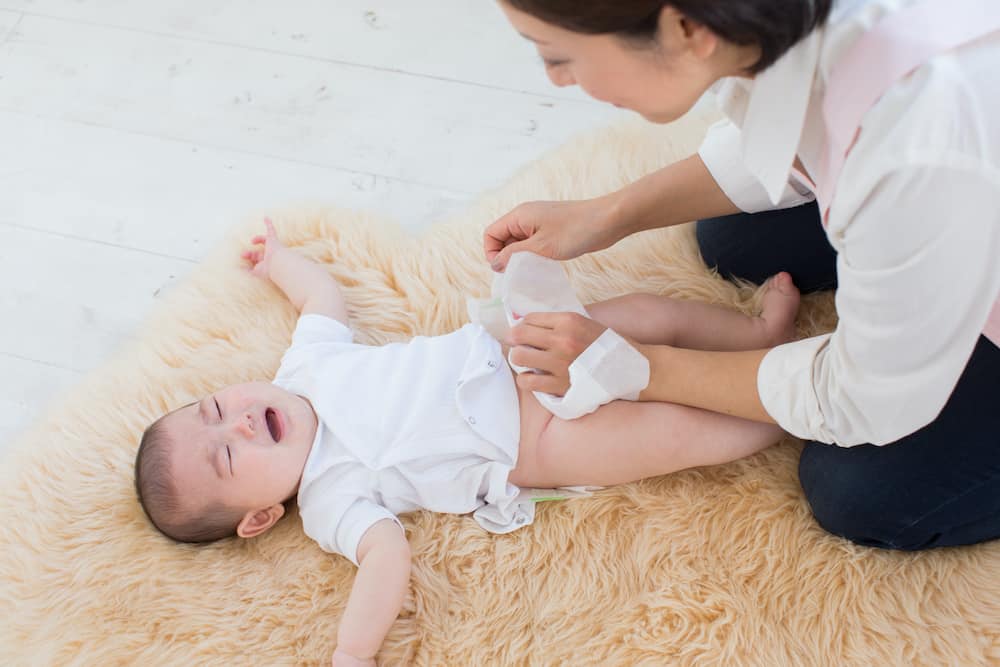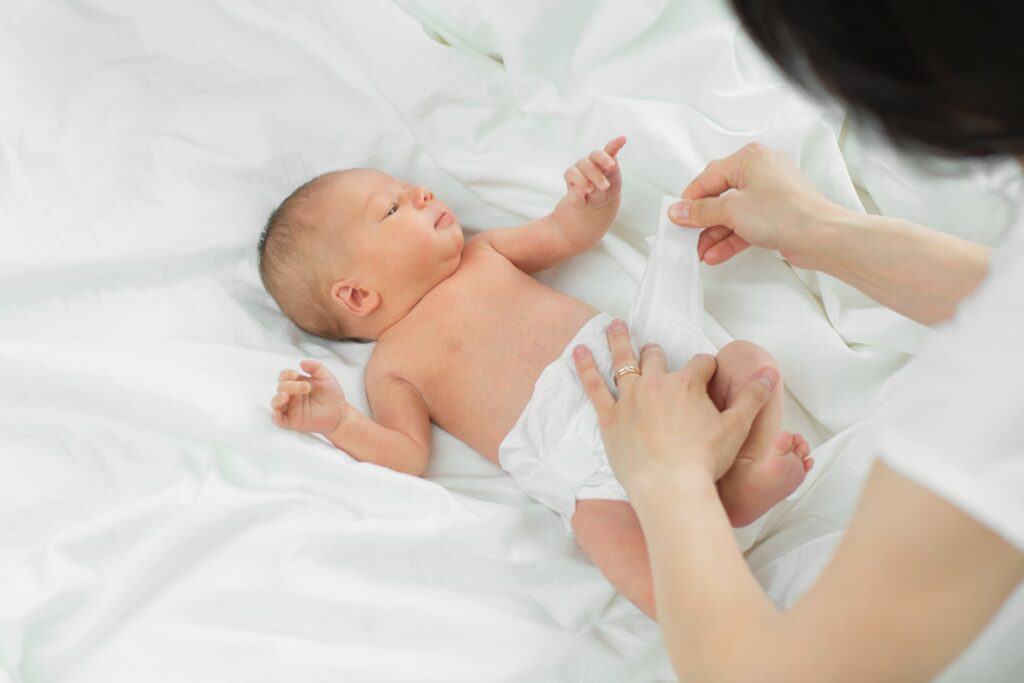Sudden fear of diaper change is a common concern among parents of infants and toddlers. It can be distressing for both the child and the caregiver, and can make diaper changes a challenging and stressful experience.
This fear can manifest in various ways, such as crying, screaming, kicking, or resisting the diaper change altogether.
Understanding the Fear of Diaper Change There are several possible causes of diaper change fear, including discomfort, anxiety, fear of separation, or a negative experience during a previous diaper change.
Some children may also be more sensitive to certain textures, smells, or sensations associated with diaper changes. It is important to identify the underlying cause of the fear in order to effectively address it.
Possible Causes of Diaper Change Fear Effective strategies for easing diaper change fear may include creating a comfortable and soothing environment, distracting the child with toys or music, involving the child in the process, or gradually exposing the child to the diaper changing routine.
In some cases, seeking professional help may be necessary if the fear is severe or persistent.
Key Takeaways
- Sudden fear of diaper change is a common concern among parents of infants and toddlers.
- The fear can be caused by discomfort, anxiety, fear of separation, or a negative experience during a previous diaper change.
- Effective strategies for easing diaper change fear may include creating a comfortable and soothing environment, distracting the child, involving the child in the process, or seeking professional help if necessary.
Understanding the Fear of Diaper Change
Diaper changes are a necessary part of caring for a baby, child, or toddler. However, some babies suddenly hate diaper changes and become scared during them.
Understanding why a baby hates diaper changes can help parents and caregivers address the issue and make diaper changes less stressful for both the baby and themselves.
Babies, especially newborns, may not like being undressed or having their diaper changed because it makes them feel vulnerable and exposed. As they get older, they may associate diaper changes with negative experiences, such as diaper rash or discomfort.
Additionally, babies may become more sensitive to changes in routine or environment as they grow and develop, which can cause them to become scared or anxious during diaper changes.
It is important for parents and caregivers to remain calm and patient during diaper changes, as babies can sense their emotions and react accordingly.
Using a soothing tone of voice, making eye contact, and providing distractions, such as toys or songs, can help make diaper changes more comfortable for the baby.
If a baby consistently hates diaper changes and becomes overly emotional or upset, it may be helpful to evaluate the diaper changing process. Are the wipes too cold? Is the diaper too tight or uncomfortable?
Are there any underlying medical issues, such as diaper rash or a yeast infection, that need to be addressed? Identifying and addressing any issues can help make diaper changes less stressful for the baby.
In summary, understanding the emotions and reasons behind a baby’s fear of diaper changes can help parents and caregivers make the process more comfortable and less stressful for everyone involved. Patience, soothing tones, and distractions can all help ease a baby’s anxiety during diaper changes.
Possible Causes of Diaper Change Fear
Parents may encounter unexpected difficulties when changing a baby’s diaper. In some cases, the baby may suddenly develop a fear of diaper changes, making it difficult for the parent to change the baby’s diaper.
There are several reasons why a baby may develop a fear of diaper changes, including physical discomfort, emotional factors, and environmental factors.
Physical Discomfort
Physical discomfort can cause a baby to fear diaper changes. A diaper rash or other type of rash can cause irritation and discomfort, making it uncomfortable for the baby to have their diaper changed. Wet or poopy diapers can also cause discomfort, leading to a fear of diaper changes.
Additionally, if the baby has a cut or sore in the diaper area, changing the diaper can be painful and uncomfortable.
Emotional Factors
Emotional factors can also contribute to a baby’s fear of diaper changes. For example, if the baby had a bad experience during a previous diaper change, they may become fearful of future diaper changes.
Additionally, if the baby is going through a difficult phase, such as teething or a growth spurt, they may become more sensitive and fearful of diaper changes.
Environmental Factors
Environmental factors can also play a role in a baby’s fear of diaper changes. If the baby is in an uncomfortable or unfamiliar environment, such as a public restroom or a friend’s house, they may become fearful of having their diaper changed.
Additionally, if the baby is a newborn or a twin, they may be more sensitive to changes in their environment and become fearful of diaper changes as a result.
In conclusion, there are several possible causes of a baby’s sudden fear of diaper changes, including physical discomfort, emotional factors, and environmental factors.
Parents should be aware of these factors and take steps to alleviate any discomfort or fear their baby may be experiencing during diaper changes.
Signs and Symptoms
When a sudden fear of diaper change occurs, there are a few signs and symptoms that parents or caregivers should look out for.
These signs can vary depending on the child’s age and temperament, but some common ones include:
- Crying or screaming when approached with a diaper change
- Resisting or fighting against being laid down on the changing table
- Moving or squirming excessively during the diaper change
- Crying or fussing throughout the entire diaper change process
- Walking away or trying to escape during the diaper change
It’s important to note that while some of these behaviors may be normal for young children, if they are suddenly exhibiting them during diaper changes, it could be a sign of fear or discomfort.
Parents or caregivers should try to identify the root cause of the fear and work to address it in a calm and reassuring manner.
One way to help alleviate a child’s fear of diaper changes is to create a consistent routine around the process. This can include using the same changing table, using a specific type of diaper, and playing calming music or singing songs during the change.
In some cases, a child’s fear of diaper changes may be related to an underlying medical condition, such as diaper rash or a urinary tract infection.
If a child’s fear persists despite efforts to create a calm and consistent routine, it may be worth consulting with a pediatrician to rule out any underlying medical issues.
Effective Strategies for Easing Diaper Change Fear
When a child suddenly develops a fear of diaper changes, it can be a challenging time for both the child and the parent.
Here are some effective strategies for easing diaper change fear:
Distraction Techniques
Distraction techniques can be very effective in easing a child’s fear of diaper changes. Parents can use toys, songs, and stories to distract the child during the diaper change. Providing a stuffed animal or a favorite toy for the child to hold can also be helpful.
Singing a song or telling a story can also be a great way to keep the child’s attention away from the diaper change.
Changing the Environment
Changing the environment can also help ease a child’s fear of diaper changes. Parents can try changing the diaper in a different spot, such as on the floor or on a changing table. Using a portable changing pad can also be helpful as it allows parents to change the diaper in different locations.
Parents can also try to make the environment more comfortable for the child by adjusting the lighting or temperature.
Involving the Child
Involving the child in the diaper change process can help the child feel more in control and less fearful. Parents can let the child hold the wipes or diaper cream and even practice wiping themselves. Allowing the child to explore the diaper changing area can also be helpful.
Parents can encourage the child to touch and feel the different items used during the diaper change.
Potty Training
If the child is ready for potty training, it can also be a good time to transition away from diaper changes. Parents can encourage the child to use the potty and provide positive reinforcement for successful attempts.
Potty training can be a gradual process, so parents should be patient and allow the child to progress at their own pace.
Overall, it is important for parents to remain calm and patient during diaper changes. Diaper change fear is a common phase that many children go through, and with the right strategies, parents can help ease their child’s fear and make diaper changes a more positive experience.
When to Seek Professional Help
If a sudden fear of diaper change persists and becomes a significant issue for the parent or caregiver, seeking professional help may be necessary.
This section will provide some guidance on when to seek professional help and what options are available.
Parenting
For parents, it can be challenging to navigate the emotional and physical demands of caring for a baby. If a parent feels overwhelmed or unable to cope with their child’s sudden fear of diaper change, they should consider seeking professional help.
This could include talking to a doctor, nurse, or therapist who specializes in child development and parenting.
Daycare
If a child attends daycare, the caregiver should be informed of the sudden fear of diaper change. The daycare provider may have experience dealing with similar situations and can provide support and guidance to both the child and the parent.
If the daycare provider is unable to manage the situation, they may recommend that the parent seek professional help.
Signs to Look Out For
Some signs that it may be time to seek professional help include:
- The sudden fear of diaper change persists for an extended period.
- The child’s fear is causing significant distress to the parent or caregiver.
- The child is showing signs of physical discomfort or pain during diaper changes.
- The child’s fear is affecting their ability to sleep or eat properly.
Professional Help Options
There are several options available for parents and caregivers who need professional help. These include:
- Speaking with a pediatrician or family doctor who can provide guidance and support.
- Consulting with a therapist who specializes in child development and parenting.
- Receiving support from a parenting group or support group for caregivers.
In conclusion, if a sudden fear of diaper change is causing significant distress to the parent or caregiver, seeking professional help may be necessary. There are several options available, including speaking with a doctor or therapist who specializes in child development and parenting.
Frequently Asked Questions
Why does my toddler suddenly hate diaper changes?
Toddlers may suddenly start hating diaper changes due to various reasons. They may be experiencing discomfort or irritation due to diaper rash or other skin conditions.
They may also be going through a phase of asserting their independence and not wanting to be interrupted from their playtime. It could also be related to anxiety or fear of the unknown.
18 month old screams at diaper change – what can I do?
If your 18 month old screams during diaper changes, it is important to remain calm and patient. Try to distract them with a toy or song, or involve them in the process by letting them hold the diaper or wipes.
You can also try changing their diaper in a different location or position to make it more comfortable for them.
How can I soothe my baby who cries during diaper change?
Babies may cry during diaper changes due to discomfort or frustration. To soothe them, try talking to them in a calm and reassuring voice, or sing a lullaby. You can also offer them a pacifier or a favorite toy to distract them.
What are some tips for changing the diaper of a 3 year old who resists?
When changing the diaper of a 3 year old who resists, it can be helpful to involve them in the process by letting them choose their own diaper or wipes. You can also offer them a reward for cooperating, such as a sticker or small treat. It may also help to explain why diaper changes are important and necessary.
Is it common for newborns to hate nappy changes and what can I do?
It is common for newborns to cry during nappy changes, as they may be uncomfortable or hungry. To make the process easier, try changing their diaper before feeding them or when they are in a calm and alert state. You can also try using a diaper cream to prevent diaper rash and discomfort.
What are some strategies for making diaper changes easier for a 9 month old who resists?
For a 9 month old who resists diaper changes, it can be helpful to offer them a distraction, such as a toy or book. You can also try changing their diaper while they are standing up or crawling, or let them explore the diaper changing area to make it more familiar and less intimidating.
Also read: How To Strip Diapers

Iesha is a loving mother of 2 beautiful children. She’s an active parent who enjoys indoor and outdoor adventures with her family. Her mission is to share practical and realistic parenting advice to help the parenting community becoming stronger.



